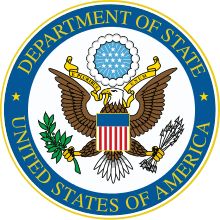United States Ambassador to Thailand
| Ambassador of the United States to Thailand
เอกอัครราชทูตสหรัฐประจำประเทศไทย | |
|---|---|
|
Seal of the United States Department of State | |
| Nominator | Barack Obama |
| Inaugural holder |
John A. Halderman as Minister Resident/Consul General |
| Formation | July 13, 1882 |
| Website | U.S. Embassy - Bangkok |
This is a list of Ambassadors of the United States to Thailand.
Thailand has had continuous bilateral relations with the United States since 1882. Relations were interrupted during World War II when Bangkok was occupied by Japanese forces. Normal relations were resumed after the war in 1945.
The United States Embassy to Thailand, which was designed by Gerhard Kallmann of Kallmann McKinnell & Wood,[1] is located in Bangkok.
Ambassadors
| Name | Portrait | Career Status | Title | Appointed | Presentation
of Credentials |
Termination of Mission | Comment |
|---|---|---|---|---|---|---|---|
| John A. Halderman[2] | 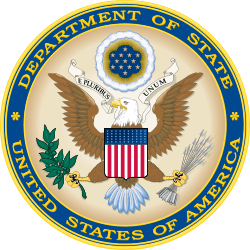 |
Minister Resident/Consul General | July 13, 1882 | October 23, 1882 | Left post April 1, 1885 | ||
| Jacob T. Child |  |
Minister Resident/Consul General | March 9, 1886 | June 5, 1886 | Presented recall, January 17, 1891 | Note: President Harrison nominated Alexander C. Moore for the ministerial post on July 9, 1890, but Moore declined the appointment. | |
| Sempronius H. Boyd | 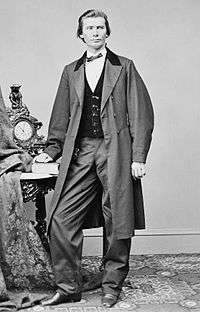 |
Minister Resident/Consul General | October 1, 1890 | January 17, 1891 | Relinquished charge, June 13, 1892 | ||
| John Barrett | 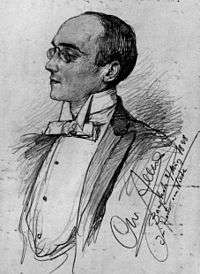 |
Minister Resident/Consul General | February 14, 1894 | November 15, 1894 | Presented recall, April 26, 1898 | ||
| Hamilton King[3] |  |
Minister Resident/Consul General | January 14, 1898 | April 26, 1898 | April 27, 1903 | ||
| Hamilton King[3][4] |  |
Envoy Extraordinary and Minister Plenipotentiary | April 27, 1903 | July 3, 1903 | Died at post September 2, 1912 | ||
| Fred W. Carpenter[5] |  |
Political appointee | Envoy Extraordinary and Minister Plenipotentiary | September 12, 1912 | January 22, 1913 | Left post November 16, 1913 | President Wilson nominated Alexander Sweek of Oregon for the post in 1913 but Sweek’s nomination was not confirmed by the United States Senate. |
| William H. Hornibrook |  |
Political appointee | Envoy Extraordinary and Minister Plenipotentiary | February 12, 1915 | May 31, 1915 | Presented recall, October 24, 1916 | |
| George Pratt Ingersoll |  |
Political appointee | Envoy Extraordinary and Minister Plenipotentiary | August 8, 1917 | November 24, 1917 | Left post June 23, 1918 | |
| George W. P. Hunt | 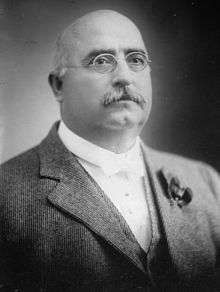 |
Political appointee | Envoy Extraordinary and Minister Plenipotentiary | May 18, 1920 | September 6, 1920 | Left post October 1, 1921 | |
| Edward E. Brodie |  |
Political appointee | Envoy Extraordinary and Minister Plenipotentiary | October 8, 1921 | January 31, 1922 | Left post May 2, 1925 | |
| William E. Russell[6] |  |
Career FSO | Envoy Extraordinary and Minister Plenipotentiary | September 28, 1925 | January 9, 1926[7] | Left post January 7, 1927 | |
| Harold Orville MacKenzie |  |
Political appointee | Envoy Extraordinary and Minister Plenipotentiary | March 3, 1927 | June 28, 1927 | Left post March 29, 1930 | |
| Arthur H. Geissler[8] |  |
Political appointee | Envoy Extraordinary and Minister Plenipotentiary | December 16, 1929 | — | — | |
| David E. Kaufman |  |
Political appointee | Envoy Extraordinary and Minister Plenipotentiary | June 12, 1930 | December 9, 1930 | Left post June 15, 1933 | |
| James Marion Baker[9] | 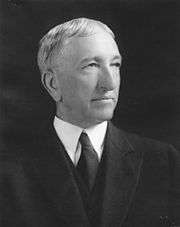 |
Political appointee | Envoy Extraordinary and Minister Plenipotentiary | August 30, 1933 | December 9, 1933 | Left post May 2, 1936 | |
| Edwin L. Neville |  |
Career FSO | Envoy Extraordinary and Minister Plenipotentiary | May 28, 1937 | October 2, 1937 | Left post May 1, 1940 | Note: Siam changed its name to Thailand in 1939, but ambassadors were commissioned to Siam until 1954. |
| Hugh Gladney Grant |  |
Political appointee | Envoy Extraordinary and Minister Plenipotentiary | April 3, 1940 | August 20, 1940 | Left post August 30, 1941 | |
| Willys R. Peck |  |
Career FSO | Envoy Extraordinary and Minister Plenipotentiary | August 19, 1941 | September 16, 1941 | Japanese forces occupied Bangkok, December 8, 1941 | Note: Thailand declared war on the United States January 25, 1942. Ambassador Peck was initially interned and then freed. He departed Thailand on June 29, 1942.
Note: Normal relations between Thailand and the United States were resumed after the war in October 1945. |
| Charles W. Yost | 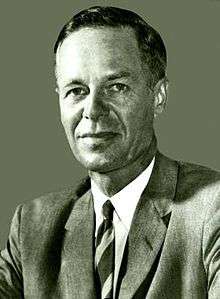 |
Career FSO | Chargé d’Affaires | Not commissioned | A letter of credence was sent to Yost by telegram, October 16, 1945. | Superseded by commissioned envoy July 4, 1946 | |
| Edwin F. Stanton |  |
Career FSO | Envoy Extraordinary and Minister Plenipotentiary | April 27, 1946 | July 4, 1946 | Promoted to Ambassador Extraordinary and Plenipotentiary April 10, 1947. | Note: The legation in Bangkok was raised to embassy status March 18, 1947. At the same time the envoy was promoted to ambassador. |
| Edwin F. Stanton[10] |  |
Career FSO | Ambassador Extraordinary and Plenipotentiary | April 10, 1947 | May 9, 1947 | Left post June 30, 1953 | Note: Hereafter ambassadors were commissioned to Thailand rather than Siam, as previous envoys had been. |
| William J. Donovan |  |
Political appointee | Ambassador Extraordinary and Plenipotentiary | August 3, 1953 | September 4, 1953 | Left post August 21, 1954 | |
| John E. Peurifoy[11] |  |
Career FSO | Ambassador Extraordinary and Plenipotentiary | September 15, 1954 | December 3, 1954 | Died near Hua Hin, August 12, 1955 | |
| Max Waldo Bishop[12] |  |
Career FSO | Ambassador Extraordinary and Plenipotentiary | December 3, 1955 | January 9, 1956 | Left post January 6, 1958 | |
| U. Alexis Johnson |  |
Career FSO | Ambassador Extraordinary and Plenipotentiary | January 30, 1958 | February 14, 1958 | Left post April 10, 1961 | |
| Kenneth Todd Young |  |
Political appointee | Ambassador Extraordinary and Plenipotentiary | March 29, 1961 | June 22, 1961 | Left post August 19, 1963 | |
| Graham A. Martin |  |
Career FSO | Ambassador Extraordinary and Plenipotentiary | September 10, 1963 | November 7, 1963 | Left post September 9, 1967 | |
| Leonard S. Unger |  |
Career FSO | Ambassador Extraordinary and Plenipotentiary | August 11, 1967 | October 4, 1967 | Left post November 19, 1973 | |
| William R. Kintner |  |
Political appointee | Ambassador Extraordinary and Plenipotentiary | September 28, 1973 | November 29, 1973 | Left post March 15, 1975 | |
| Charles S. Whitehouse | 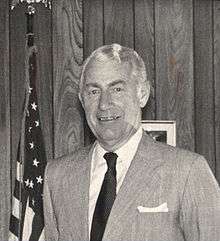 |
Career FSO | Ambassador Extraordinary and Plenipotentiary | May 8, 1975 | May 30, 1975 | Left post June 19, 1978 | |
| Morton I. Abramowitz |  |
Career FSO | Ambassador Extraordinary and Plenipotentiary | June 27, 1978 | August 9, 1978 | Left post July 31, 1981 | |
| John Gunther Dean |  |
Career FSO | Ambassador Extraordinary and Plenipotentiary | October 1, 1981 | October 26, 1981 | Left post June 6, 1985 | |
| William Andreas Brown |  |
Career FSO | Ambassador Extraordinary and Plenipotentiary | June 6, 1985 | July 5, 1985 | Left post August 5, 1988 | |
| Daniel Anthony O'Donohue |  |
Career FSO | Ambassador Extraordinary and Plenipotentiary | July 11, 1988 | August 13, 1988 | Left post August 10, 1991 | |
| David Floyd Lambertson |  |
Career FSO | Ambassador Extraordinary and Plenipotentiary | July 22, 1991 | September 24, 1991 | Left post August 25, 1995 | |
| William H. Itoh |  |
Career FSO | Ambassador Extraordinary and Plenipotentiary | December 19, 1995 | February 20, 1996 | Left post February 1, 1999 | |
| Richard E. Hecklinger |  |
Career FSO | Ambassador Extraordinary and Plenipotentiary | December 1, 1998 | March 9, 1999 | Left post December 21, 2001 | |
| Darryl N. Johnson | Career FSO | Ambassador Extraordinary and Plenipotentiary | November 26, 2001 | March 29, 2002 | Left post December 28, 2004 | ||
| Ralph Leo Boyce |  |
Career FSO | Ambassador Extraordinary and Plenipotentiary | July 2, 2004 | March 9, 2005 | Left post, July 21, 2007 | |
| Eric G. John | 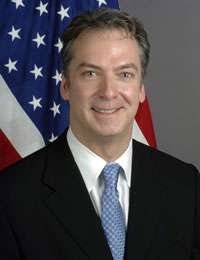 |
Career FSO | Ambassador Extraordinary and Plenipotentiary | August 3, 2007 | January 8, 2008 | September 30, 2010 | |
| Kristie A. Kenney | 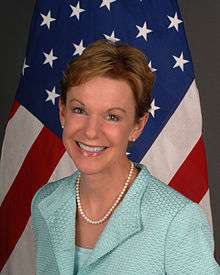 |
Career FSO | Ambassador Extraordinary and Plenipotentiary | December 9, 2010 | January 8, 2011 | November 6, 2014 | |
| Glyn T. Davies | .jpg) |
Career FSO | Ambassador Extraordinary and Plenipotentiary | August 6, 2015 | October 2, 2015 | Incumbent | |
U.S. diplomatic terms
Career FSO
After 1915, The United States Department of State began classifying ambassadors as career Foreign Service Officers (FSOs) for those who have served in the Foreign Service for a specified amount of time.
Political appointee
A person who is not a career foreign service officer, but is appointed by the president (often as a reward to political friends).
Appointed
The date that the ambassador took the oath of office; also known as “commissioning”. It follows confirmation of a presidential appointment by the Senate, or a Congressional-recess appointment by the president. In the case of a recess appointment, the ambassador requires subsequent confirmation by the Senate.
Presented credentials
The date that the ambassador presented his letter of credence to the head of state or appropriate authority of the receiving nation. At this time the ambassador officially becomes the representative of his country. This would normally occur a short time after the ambassador’s arrival on station. The host nation may reject the ambassador by not receiving the ambassador’s letter, but this occurs only rarely.
Terminated mission
Usually the date that the ambassador left the country. In some cases a letter of recall is presented, ending the ambassador’s commission, either as a means of diplomatic protest or because the diplomat is being reassigned elsewhere and replaced by another envoy.
Chargé d'affaires
The person in charge of the business of the embassy when there is no ambassador commissioned to the host country. See chargé d'affaires.
Ad interim
Latin phrase meaning "for the time being", "in the meantime". See ad interim.
After 1915, The United States Department of State began classifying ambassadors as career Foreign Service Officers (FSOs) for those who have served in the Foreign Service for a specified amount of time.
Political appointee
A person who is not a career foreign service officer, but is appointed by the president (often as a reward to political friends).
Appointed
The date that the ambassador took the oath of office; also known as “commissioning”. It follows confirmation of a presidential appointment by the Senate, or a Congressional-recess appointment by the president. In the case of a recess appointment, the ambassador requires subsequent confirmation by the Senate.
Presented credentials
The date that the ambassador presented his letter of credence to the head of state or appropriate authority of the receiving nation. At this time the ambassador officially becomes the representative of his country. This would normally occur a short time after the ambassador’s arrival on station. The host nation may reject the ambassador by not receiving the ambassador’s letter, but this occurs only rarely.
Terminated mission
Usually the date that the ambassador left the country. In some cases a letter of recall is presented, ending the ambassador’s commission, either as a means of diplomatic protest or because the diplomat is being reassigned elsewhere and replaced by another envoy.
Chargé d'affaires
The person in charge of the business of the embassy when there is no ambassador commissioned to the host country. See chargé d'affaires.
Ad interim
Latin phrase meaning "for the time being", "in the meantime". See ad interim.
Notes
- ↑ Hevesi, Dennis (2012-06-24). "Gerhard Kallmann, Architect, Is Dead at 97". New York Times. Retrieved 2012-07-16.
- ↑ Blackmar, Frank Wilson (1912). Kansas: A Cyclopedia of State History, Embracing Events, Institutions, Industries, Counties, Cities, Towns, Prominent Persons, Etc. Standard Publishing Company. p. 801.
- 1 2 Minister King was promoted to Envoy Extraordinary and Minister Plenipotentiary during his term, which required a new commission.
- ↑ King was commissioned as Envoy Extraordinary during a recess of the Senate and recommissioned after confirmation on November 16, 1903.
- ↑ Carpenter was commissioned during a recess of the Senate; recommissioned after confirmation on March 1, 1913.
- ↑ Russell was commissioned during a recess of the Senate and recommissioned after confirmation on December 17, 1925.
- ↑ Russell was officially received on January 9, 1926.
- ↑ Geissler took the oath of office, but did not proceed to post.
- ↑ Baker was commissioned during a recess of the Senate and recommissioned after confirmation on January 15, 1934.
- ↑ Stanton was promoted to Ambassador Extraordinary and Plenipotentiary April 10, 1947. That required a new commission
- ↑ Peurifoy was commissioned during a recess of the Senate and recommissioned after confirmation on December 3, 1954.
- ↑ Bishop was commissioned during a recess of the Senate and recommissioned after confirmation on January 18, 1956.
See also
- Thailand – United States relations
- Foreign relations of Thailand
- Ambassadors of the United States
- Embassy of the United States, Bangkok
References
- United States Department of State: Background notes on Thailand
 This article incorporates public domain material from the United States Department of State website http://www.state.gov/r/pa/ei/bgn/index.htm (Background Notes).
This article incorporates public domain material from the United States Department of State website http://www.state.gov/r/pa/ei/bgn/index.htm (Background Notes).
External links
- United States Department of State: Chiefs of Mission for Thailand
- United States Department of State: Thailand
- United States Embassy in Bangkok
This article is issued from Wikipedia - version of the 11/4/2016. The text is available under the Creative Commons Attribution/Share Alike but additional terms may apply for the media files.
